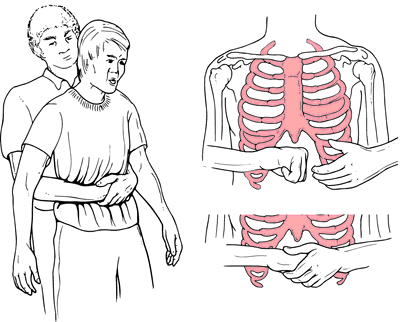So … what would you do if someone around you starting choking. Or if they choked, then lost consciousness? What would you do if you choked and no one else was around? Don’t you think you should know? Read on …
First things first. You’ve all heard of the Heimlich maneuver, even if you don’t know how to do it. My job today is to make this easy for you. My first task will be to pass on the physician’s mantra of “Do No Harm.” To that end, let’s start with things you shouldn’t do.
- If the person is able to speak, don’t interfere.
- If the person is coughing and still has a normal level of awareness, don’t interfere.
- If the person is able to breathe in and out without excessive difficulty, don’t interfere.
- If the person is conscious, don’t place anything in his/her mouth trying to extract an object.
Next, let’s review a few quick points to help you understand what could be going on.
- Choking is occurring because something is blocking the airway (aka windpipe).
- Choking is dangerous because complete blockage will prevent oxygen from circulating thorough the body.
- Choking is deadly because without oxygen, permanent brain damage will likely occur in four to six minutes.
Partial blockage isn’t the same as complete blockage. The body has protective reflexes to deal with blockage. That’s what coughing is. Once blockage has become complete, you’re facing a life-threatening emergency, and the risks of doing something outweigh the risks of doing nothing.
It’s not that difficult to know if someone’s choking; they’re likely grabbing their throat. You would do well to know what it looks like if someone has already choked or is choking but can’t use his/her hands. Here are some clues:
- Coughing may be increasingly weaker.
- They likely will exhibit difficulty breathing.
- They may be unable to speak.
- Their skin may have a bluish or purplish color.
- You may hear high-pitched musical sounds while they’re breathing.
- They may have blacked out (from the blockage).
Here are universally accepted steps to the Heimlich maneuver (in someone not obese or pregnant):
- Ask the person, “Are you choking?”
- Then ask them to speak. If they can speak or are vigorously coughing, you watch and wait. If not, proceed.
- Standing behind the person, wrap your arms around his/her waist.
- Placing your thumb just above the belly button (navel), make a fist with one hand.
- Grasp the fist with your other hand.
- Thrust your fist quickly, upward and inward.
- Repeat until the person either loses consciousness or the object is dislodged.
If the person is obese or pregnant, wrap your arms around the chest, not the abdomen. Place your fist between the nipples on the middle of the breastbone, and make firm thrusts back toward you.
If the person loses consciousness, there are four steps you must take.
- If you see something blocking the airway, try to remove it.
- Lower the person to the floor, preferably on his/her side until you start CPR or if vomiting starts.
- Have someone call 911.
- Begin CPR.
Of course, prevention is key. Take care to chew your food slowly and thoroughly.
Here are three more tips for those most at risk:
- Children: Keep them away from small objects that can be placed in their mouths.
- Elderly: Make sure their dentures fit appropriately.
- Adults: Limit alcohol intake around the time of eating.
In an upcoming Straight, No Chaser, we’ll also add a post for you regarding how to handle yourself and infants (less than one year old) if choking.
Feel free to ask your SMA expert consultant any questions you may have on this topic.
Order your copy of Dr. Sterling’s new book Behind The Curtain: A Peek at Life from within the ER at jeffreysterlingbooks.com, iTunes, Amazon, Barnes and Nobles and wherever books are sold.
Thanks for liking and following Straight, No Chaser! This public service provides a sample of what http://www.SterlingMedicalAdvice.com (SMA) and 844-SMA-TALK offers. Please share our page with your friends on WordPress, like us on Facebook @ SterlingMedicalAdvice.com and follow us on Twitter at @asksterlingmd.
Copyright © 2016 · Sterling Initiatives, LLC · Powered by WordPress




